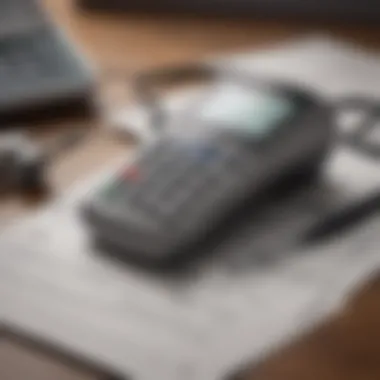Steps to Take If You've Lost Your Medicare Number


Intro
Losing your Medicare number can create a lot of confusion. This number is crucial for managing medical services and understanding billing processes. Without it, accessing healthcare may seem like a challenging task. Understanding how to locate your lost Medicare number, as well as knowing the steps to take if retrieval seems impossible, is essential. This article provides clear guidelines to help you navigate your options when faced with this situation.
The Importance of Your Medicare Number
Your Medicare number serves not just as an identifier for your Medicare account. It is significant for ensuring that you receive the medical services needed. Without this information, healthcare providers struggle to validate your insurance, which may disrupt your access to necessary treatments. Also, maintaining privacy is vital, so being thorough about how you store and protect this number is key for prevention.
How to Locate Your Lost Medicare Number
If you misplaced your Medicare number, follow these steps to recover it:
- Check your Original Medicare card: If you still have the card, your number is printed on it.
- Review your paperwork: Look through any medical bills or documents from healthcare providers as the number might be present.
- MyMedicare.gov account: Access your account online to find your Medicare number saved in your profile.
If after all, you still can't find it, consider reaching out for more help. The Medicare help line is available for assistance.
What If You Can’t Retrieve It?
In cases where you cannot locate your Medicare number:
- Contact Medicare directly: Call 1-800-MEDICARE (1-800-633-4227) to request assistance from a representative.
- Visit your local Social Security Administration (SSA): They can guide you in obtaining your number or replacing your card, if required.
- Send a request for a replacement card: You can fill out the necessary form and send it online or through the mail.
Accessing these resources promptly is critical. Ensuring that you take steps to recover your Medicare number may contribute to the prevention of potential medical billing errors during this time.
Preventive Measures for the Future
To guard your information and prevent losing your Medicare number again, consider these actions:
- Store your Medicare card securely: Use a safe at home to keep important documents.
- Create digital copies: Use encrypted files or password managers to securely save all important numbers.
- Practice caution while providing your number: Only share your Medicare number when absolutely necessary and always verify who you give it to.
By staying cautious about the use and storage of your Medicare information, you can reduce the chances of misplacing it. Maintaining your Medicare number allows for seamless access to the healthcare you are entitled to receive.
Understanding the Importance of Your Medicare Number
The Medicare number holds significant weight for seniors and some younger individuals who qualify for this program. Its primary function is to identify beneficiaries and streamline access to essential healthcare services. Understanding why this number is crucial can help individuals recognize the necessity of protecting and maintaining access to it.
Role of the Medicare Number
A Medicare number is fundamentally a unique identifier assigned to each individual enrolled in the program. It simplifies the billing process between providers and Medicare, allowing patients access to healthcare without unnecessary delays. It is linked to critical personal information, including eligibility for services, prescription drug coverage, and coordination among various healthcare providers. Therefore, having this number accessible is a practical necessity for rapid and effective interactions in healthcare settings.
Consequences of Losing Your Number
Losing a Medicare number can lead to several frustrating consequences. Firstly, without this number, individuals may face delays or interruptions in receiving the care they require. Healthcare providers often request this number to confirm a patient's eligibility for services.
Additionally, medical claims cannot be processed properly if the number is not available. This could result in out-of-pocket expenses that might otherwise have been covered by Medicare. Moreover, it can lead to challenges in accessing routine care, medications, and even emergencies if proof of eligibility is needed on short notice.
It’s important to remember that overcoming loss of your Medicare number is not a complicated process, but it does require prompt action and awareness of the right steps to take.
Understanding the importance of the Medicare number thus sheds light on the practical aspects of living with Medicare benefits. Awareness can guide individuals to take the necessary preventive actions to safeguard this crucial identifier.


Identify the Circumstances of Loss
Understanding how you lost your Medicare number is crucial in the recovery process. This section will shed light on various scenarios that can lead to losing your number, helping you figure out the next steps. Responding accurately to the specific circumstances of the loss can streamline the recovery process and increase your chances of promptly regaining access to necessary services.
Was It Stolen or Misplaced?
Identifying whether your Medicare number was stolen or simply misplaced changes the strategy for recovery. If it was stolen, swift action is essential. It is not just a matter of replacing a card; the risk of identity theft can result. Stolen information can lead to fraudulent medical charges, which might affect your finances and credit carefully. If your number was indeed stolen, it's vital to monitor your insurance statements closely. Report any anomalies to Medicare and consider taking additional identity protection measures.
In contrast, if you suspect that your Medicare number has been misplaced, the situation may feel less urgent but still needs attention. Sometimes, a minor search around your home can turn up the missing card or other documents containing the number. Take your time to methodically search common places where you stash important documents, like filing cabinets or drawers.
Keeping a record of where you store important numbers can help prevent future case of misplacement.
When Did You Last Have It?
Establishing the timeline of when you last accessed your Medicare number can be very beneficial. This provides insight into potential places where it might be found as well as helps identify an effective replacement protocol. A reflection on your recent activities might just lead you back to a location where you last had your card or number. Common moments can include recent medical appointments, healthcare claims submissions, or other correspondence indicating your need for this vital information.
When you recognize the last verified time you had your Medicare number, it becomes easier to retrace the day’s activities for lost documentation. Creating a checklist can help outline the steps taken and narrow down areas of focus.
In cases where it's been weeks or even months, determining patterns leading up to its disappearance may reveal underlying habits that can be redirected. Having awareness of the lapse time enhances your chances of recovering crucial information – big or small matters here make a significant difference.
Retrieving Your Medicare Number
Retrieving your Medicare number is a critical step after realizing its loss. The number serves as a unique identifier for Medicare beneficiaries, facilitating access to important healthcare services. Without it, patients may face obstacles when seeking medical help. Therefore, successfully retrieving or recovering your Medicare number expedites any necessary care, making it vital for continuity in healthcare services and management. Here, we will explore ways to find your number through accessible channels.
Checking Your Medicare Card
One of the first steps to retrieve your Medicare number is to check your physical Medicare card. Most beneficiaries should have a card given when they enrolled in Medicare. The front of your Medicare card displays your name, the number itself, and defines your Medicare coverage. If you have misplaced the card but remember taking it out, consider retracing your steps to where it might have been used.
Additionally, it can help to look at various storage locations where you might keep important documents, like a filing cabinet or a personal safe. Remember to ensure the card is kept safe moving forward, as it is an essential document for your healthcare.
Using the Medicare Online Account
If you lack your card and wish to retrieve your number quickly, using the Medicare online account is a suitable option. Setting up an online account with Medicare allows you to access a wealth of information, including your Medicare number. To create or log into your account, first go to the official Medicare website. You will need to provide some personal information for verification.
Once logged in, navigate to the 'Beneficiary Overview' section. There, your Medicare number should appear along with your coverage details. If you have already forgotten your account credentials, follow the 'Forgot Password' link for recovery options. This method is efficient and allows for instant access.
Contacting Medicare for Assistance
If neither of the above options yields results, you can contact Medicare directly for assistance. You can call 1-800-MEDICARE (1-800-633-4227). A representative will help you verify your identity to retrieve your Medicare number. It's prudent to have some personal information ready when you call, such as your name, date of birth, and possibly your Social Security number.
The process typically involves confirming your identity, after which the representative will assist you in obtaining the number. Take notes during this communication for future reference. If you prefer, you may also visit a local Social Security office for assistance in person, sometimes offering face-to-face connection with someone who can aid in the retrieval process.
Always keep in mind that safeguarding your Medicare number is equally important. One strategy to protect it is to keep your card in a safe place and avoid sharing it unnecessarily.
If You Cannot Retrieve Your Number
Losing your Medicare number can create significant hurdles in your access to healthcare services. Sometimes the effort to retrieve this key piece of information may not yield results. In such cases, it's crucial to have a plan of action that reassures you while also ensuring you continue to obtain the necessary medical care. An understanding of the various methods you can use to navigate this issue, despite not being able to retrieve your Medicare number, can provide a sense of control over your situation.
Request a Replacement Card
If all efforts to recover your Medicare number have failed, requesting a replacement card from Medicare is a practical solution. This replacement card will bear your number, restored so you can access medical services without further delay.


To begin the process, you can do it online using the Medicare portal if you're already signed up for an account. Alternatively, you can call the Medicare helpline. When making the call or filling out the request, be ready with your personal information. You’ll need data such as your name, date of birth, and Social Security number. After processing, your new card should arrive by mail within a few weeks. This official document is vital to maintain continuity in your healthcare.
It's important to note that while the process sounds straightforward, it can take time, and you should keep this in mind if you’re anticipating immediate medical care. So, act promptly.
Using Alternative Methods for Identification
In case you experience significant delays or challenges in receiving a new Medicare card, alternative methods for identification exist. These methods ensure that your access to healthcare services continues without interruption.
- Social Security Card: Your Social Security number can sometimes be enough to verify your identity with healthcare providers. Always keep this document secure but accessible as it's a central piece of your identification.
- Documented History: If there's a history of your prior Medicare services or prescriptions, you can present this evidence to your provider. This may enable them to locate your account via their system, even without having the number directly.
- Medicare Online Account: In some cases, logged-in users may find their number displayed within their account information. If you’re putting off creating an online account due to complexity concerns, remember that it can ultimately save time.
- Provider Communication: Communicate openly with your healthcare provider about your situation. They are often willing to support you in obtaining the needed services while alternative identification methods are being arranged.
Remember: Being prepared with documentation and a comprehensive plan can greatly smoothen the process.
The steps above illuminate viable routes when you're faced with difficulties retrieving your Medicare number. A cautiously applied combination of these options can help frequently stressed individuals navigate this diagnostic and identification gap effectively.
Keeping Your Medicare Information Safe
Keeping your Medicare information safe is not just a personal responsibility; it is essential to protect your identity and your healthcare benefits. The sensitive nature of your Medicare number means that improper handling or exposure can lead to identity theft. Safeguarding this information is of utmost importance as it ensures you remain eligible for the services and treatments you depend on. Moreover, a void left by the loss or exposure of your Medicare number can complicate your access to necessary medical care and services mandated by your Medicare plan.
Strategically managing where and how you store your Medicare information can mitigate risks. Outside of physical storage, maintaining digital security practices offers another layer of protection. As mentioned earlier, the entities that process Medicare claims view your Medicare number as a definitive identifier. If you take the right measures for safeguarding this identification, you contribute not just to your own security, but to a greater social barrier against fraud.
Secure Storage Practices
To effectively secure your Medicare number, consider these storage practices:
- Physical Copies: Store paper copies in a locked cabinet. Avoid carrying your Medicare card unless it is absolutely necessary.
- Digital Records: Use appplications with strong encryption if you prefer storing a digital copy. Do not keep information on shared devices.
- Limit Access: Ensure only trusted individuals know where to find your Medicare information, such as family or caregivers.
- Regular Checks: Conduct regular assessments of your storage practices to ensure they remain effective. Make adjustments as necessary, especially fitting changes in housing or caregiving situations.
Following these practices helps keep outsiders from gaining unauthorized access to your Medicare number. The goal is to create layers of protection that deter breaches.
Recognizing Phishing Scams
With technology increasingly blending with healthcare interactions, being able to identify phishing scams becomes crucial for Medicare beneficiaries. These scams often seek to obtain your personal, health, or financial information under false pretenses.
Common red flags to recognize phishing scams include:
- Unexpected Communication: Be cautious of emails or texts you didn’t anticipate. Official communication will usually originate from established channels.
- Request for Sensitive Information: Authentic Medicare representatives will not request sensitive information like your Medicare number through insecure channels like email or text messages.
- Errors and Typos: Many phishing scams are filled with misspellings or questionable domain names; scrutinize communications before acting on them.
By recognizing these patterns, you can significantly reduce the risk of your Medicare information being exposed. Reporting observed scams can help authorities combat these fraudulent activities tightly, protecting others in the community.
To proactively protect your health and identity, understanding storage security and recognizing deceptive practices heightens your awareness amid an ever-evolving digital sphere.
Identity Theft Considerations
In today's digital age, personal details such as the Medicare number are sensitive. Protecting this piece of information is crucial. Understanding the implications of identity theft can save individuals from severe financial and health-related troubles.
Understanding Risks of Identity Theft
When Medicare details are mishandled or lost, it opens a door to potential identity theft. Someone could misuse your Medicare number to fraudulently obtain healthcare services, medications, or even divert any benefits. This can lead to unexpected medical bills or impacts on your insurance claims. Furthermore, correcting such incidents can be time-consuming and stressful, potentially affecting not only your financial health but also your healthcare continuity.
Table: Various Risks from Identity Theft
| Risk | Description | | Fraudulent Claims | Other individuals accessing services under your Medicare number. | | Impact on Health Records | Incorrect or harmful information added to your medical history. | | Financial Liabilities | Accumulation of non-paid services affecting your credit score. | | Privacy Invasion | Loss of control over personal and financial information. |


Minimizing these risks starts with awareness and prompt action when personal information is at risk. Being diligent about monitoring personal records helps catch suspicious activities sooner.
Steps to Take If Identity Theft Occurs
Detecting that your information has been compromised requires immediate steps to mitigate potential damage. First, report the incident. Contact your Medicare provider to inform them about what has happened. Request that any fraudulent activities linked to your Medicare number be investigated. You may also consider resetting passwords for any online accounts linked to your personal data to prevent unauthorized access.
Important: Regularly review medical statements and billing records for any unfamiliar charges.
Additionally, check your credit report. Look for any unusual accounts or applications that you did not authorize. Free credit reports are available from various providers at least once a year. This is crucial for spotting identity theft early.
Finally, inform any relevant authorities if necessary and consider placing a fraud alert on your credit file. This simple step can prevent new accounts from being opened in your name. Understanding prevention is as important as rectifying identity theft aftermath. Keep monitoring effectively to safeguard yourself moving forward.
Staying Updated on Medicare Policies
Staying informed about Medicare policies is crucial for individuals who rely on the system for their healthcare needs. Medicare is complex and undergoes periodic changes. These updates can significantly affect coverage options, benefits, and costs. Consequently, not being aware of these changes can lead individuals to potentially miss out on essential services or pay more than necessary. Being diligent in understanding new protocols and offerings is a step toward advocacy and personal empowerment in managing healthcare plans.
Maintaining awareness about Medicare policies helps ensure patients consistently have access to necessary medical care. It can also lead to improved communication with healthcare providers, which is vital for effective treatment outcomes. Harnessing knowledge allows individuals to make informed choices about their health plans, from selecting a suitable provider to choosing the most economical drugs.
The need for awareness is not limited to individuals but extends to families and caregivers. As they monitor and advocate on behalf of their loved ones, knowledge enables them to better navigate the complexities of Medicare. Recent trends reveal shifting eligibility and criteria that may directly impact coverage. Staying educated about these matters enhances preparedness and adaptability.
"Continuous learning about Medicare options can lead to significant healthcare savings and advantages for patients."
Regularly Reviewing Medicare Communications
To efficiently manage your Medicare and avoid unwanted surprises, reviewing all communications from Medicare is necessary. This involves keeping an eye on letters and newsletters that may arrive through mail. Oftentimes, extremely relevant updates, including changes in coverage or alterations to procedures, come in written format. Reading and understanding these documents ensures you stay fully informed about your options.
Websites and official portals from the federal government are also key resources. They usually store archives of previous communications where individuals can gather informative content. Patients need to not only browse through new changes but join discussion forums or online communities that share insights from experiences. Engaging with others seeking similar knowledge can add extra clarity.
Accessing Online Resources for Medicare
Accessing online resources is another viable strategy to stay updated on Medicare policies. The official Medicare website — www.medicare.gov — hosts comprehensive information concerning what to expect in coverage and plans. Users can explore current benefits, updates to legislation, and monthly updates on any adjustments to premiums or deductibles.
Medicare also provides resource centers for frequently asked questions and chat support for immediate assistance. This service often provides prompt answers for basic inquiries. Most importantly, registered users can check for personalized Medicare health plans, making oversight will a much easier process for those actively searching for current schemes.
Another beneficial resource can be found on social media platforms like Facebook. Various community forums focus on tips users share about their experiences with Medicare, helping individuals better focus on nuanced details. Being part of such networks often means managers are proactively involved and well-informed.
By utilizing these insights, individuals can transform the sometimes-confusing landscape of Medicare into a clearly defined pathway to continuous care.
The End
Losing your Medicare number can be a daunting situation, but with the right knowledge and actions, it can be addressed swiftly. This article lays out essential steps for individuals facing this challenge, making it easier to manage both health care access and medical billing issues. The key elements provided in the guidance serve as tools for empowerment. Understanding your Medicare number's significance facilitates timely treatments and continuity in care, which is crucial for anyone relying on this beneficial program. Staying informed and proactive mitigates potential issues while ensuring peace of mind.
Recap of Important Steps
- Identify the circumstances under which the number was lost.
- Retrieve the number through available channels—check your Medicare card or log into your online account.
- Contact Medicare directly for assistance if retrieval is not possible.
- Request a replacement card if needed and utilize alternative methods for identification.
- Implement secure storage practices to safeguard your information.
- Stay informed about your rights in case of identity theft and take necessary precautions.
- Regularly review Medicare communications and utilize online resources for updates.
By taking these steps, you can best manage any disruption caused by this loss and ensure future accessibility to vital medical resources.
Encouragement to Stay Proactive
Maintaining awareness of your Medicare information is essential in today's complex healthcare environment. Taking actionable steps today helps prevent more significant issues later. Ignoring your Medicare number’s safety could result in personal difficulties and unnecessary complications when seeking care. Stay informed about potential scams targeted toward Medicare beneficiaries. Detection and avoidance of such risks contribute to better health care outcomes.
Regular checks on Medicare communications and updating your information when necessary helps maintain seamless access to your health services. Proactivity enhances not just your record safety but also promotes better overall health management.
Prevent disaster before it strikes by implementing simple storage solutions for your Medicare data, such as keeping it in a secure location or using organizers. By keeping your information protected and up to date, you help to ensure smoother interactions with health care providers.
Through diligence, you empower yourself within the Medicare framework, facilitating health benefits that continue unbroken, even in events such as a lost Medicare number.



